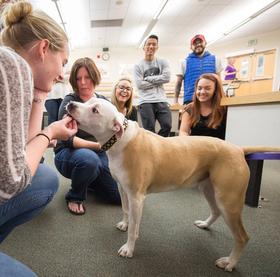Addiction counselors work with individuals who have issues with drugs, alcohol, gambling or eating. These professionals operate in a variety of settings, providing both individual and group counseling services that offer the support patients need to move on from their additions. If you have a passion for helping people and are willing to put in the time and training to obtain certification in your field, addiction counseling might be the right job for you.
Many students begin their study in addiction counseling at their local community college, and then they move to a professional position or a four-year university where they can continue to advance in their field. While many states require individuals to have a master's degree to become licensed as an addiction counselor, others use their community college training to get their foot in the door and advance with on-the-job experience.
About Addiction Counseling
According to the U.S. Bureau of Labor Statistics, job growth for addiction counselors over the next decade is expected to be favorable. The job may be performed in a variety of settings, from private offices to clinics and hospitals. Counseling sessions are frequently in group format, with many patients coming to weekly sessions that help them overcome their addictions over a period of time. These counseling sessions provide support and information to help people modify behaviors and address issues that led to the addictions in the first place.
Most states require addiction counselors to obtain a license to counsel patients. Licensure varies by state, and it may include a master's degree and a certain number of hours of training first. Some addiction counselors may also want to become certified to practice in their state of choice. Certification may be offered through a community college program or by taking a written examination. While certification is usually not required to enter the addiction counseling industry, the process may make it easier to land a job right after training is complete.
While a four-year and graduate degree are often required to become a licensed addiction counselor, programs at community colleges often give students the initial training required to enter this industry. After earning an associate's degree in addiction counseling, students can choose to transfer to a four-year university or land a job as an addiction counseling assistant for valuable on-the-job training. We have a few community colleges across the country that offer programs in addiction counseling.
NHTI
NHTI, Concord's community college in New Hampshire, offers a degree of Associate in Science with a major in addiction counseling. This degree program provides the necessary training and education to open the door to a rewarding career in addiction counseling and human services.
Graduates of the program might work in a clinical setting, or in youth and group homes, treatment centers and mental health agencies, according to the college website. Students can also opt to transfer into a baccalaureate program that advances them in their goal of becoming a New Hampshire Licensed Alcohol and Drug Counselor.
This video describes the addiction counseling program at Montana State University.
Flathead Valley Community College
In Montana, students interested in a career in addiction counseling can earn an AA degree in substance abuse counseling through Flathead Community College. According to the college website, the program teaches students how to understand addiction and the treatment process, as well as ways to apply their knowledge to the clinical setting.
After graduating from this program, students must complete 1,000 hours of supervised work experience in a state-licensed substance abuse program to apply for the Montana Licensed Addiction Counselor test.
Community College of Philadelphia
This Pennsylvania school offers a Behavioral Health/Human Services curriculum that prepares students for the certification process that helps them gain employment as addiction counselors. The website for the Community College of Philadelphia explains that the state of Pennsylvania allows students with an associate's degree in addiction counseling to move directly into a position as an addiction counseling assistant or transfer to a four-year university to earn a bachelor's degree in a human service field.
Those who move into the workforce right out of community college can also become addiction counselors with their current degree and two years of field experience.
This video describes the addiction counseling program at Minneapolis Community and Technical College.
The field of addiction counseling is a challenging and rewarding one, with many options available in terms of the work environment and job description. While many states require additional training to become licensed as an addiction counselor, community colleges offer the perfect way to enter the field and determine if it is a good career choice for you. If you have a passion for helping people, find out if a community college in your area offers a training program in addiction counseling and get started on a rewarding career today.
Questions? Contact us on Facebook. @communitycollegereview















